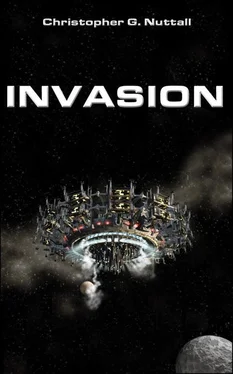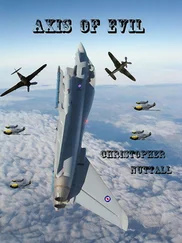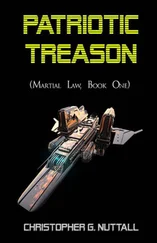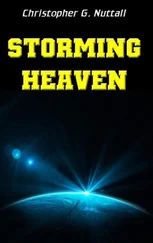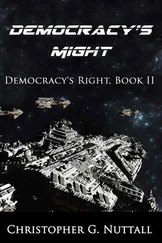Christopher G. Nuttall
INVASION
To Larry Niven and Jerry Pournelle, for hours of enjoyment.
Thanks guys!
No one would have believed in the last years of the nineteenth century that this world was being watched keenly and closely by intelligences greater than man’s and yet as mortal as his own; that as men busied themselves about their various concerns they were scrutinised and studied, perhaps almost as narrowly as a man with a microscope might scrutinise the transient creatures that swarm and multiply in a drop of water… yet across the gulf of space, minds that are to our minds as ours are to those of the beasts that perish, intellects vast and cool and unsympathetic, regarded this earth with envious eyes, and slowly and surely drew their plans against us.
—
The War of the Worlds , HG Wells
The President of the United States, Colonel Paul James was surprised to note, looked younger than he had expected, although more impressive in person than on the television. Paul had grown up in a time when politicians were carefully photographed to make them look either intelligent or idiotic — depending on the political values of the given media source — and he had thought that he was used to it, but the President looked oddly impressive. He was fairly handsome, in an unfinished kind of way… but at the moment, he looked shocked. It was hard for anyone, particularly Paul, to blame him. He’d known for years that he might be faced with this moment, but the President had probably never considered it, outside his wildest nightmares.
“Explain it to me again,” the President said, finally, briefly sparing a glance for the three other Cabinet members in the room. “We have a what coming our way?”
Paul took a breath. It didn’t get any easier. “There’s an alien starship approaching Earth,” he said. He’d spent years, literally, trying to think of ways to get that basic message across to the political lords and masters of the United States, but somehow it had never seemed easy. He had been prepared for disbelief, or doubt… and he didn’t know how the President would react. “Perhaps I should start at the beginning.”
The President glanced once at the calendar mounted on his desk. “It does not appear to be April 1 st,” he said, with a hint of the same smile that had captivated a certain class of voters. “I assume that no one would bring a joke about such matters into the Oval Office, so… by all means, begin at the beginning.”
“A day ago, the International Space Station was doing a routine sky-search with one of the telescopes orbiting near the installation,” Paul began. “The search was actually part of the asteroid defence program, which was set up to hunt for possibly dangerous NEO asteroids — that is, asteroids near enough to Earth to pose a danger…”
“I’m familiar with the program,” the President said. He’d even voted funding for the program. “The telescope sweep found an alien starship?”
“It found the drive flare from the starship as it lit off its drives,” Paul said, carefully. This wasn’t going to be easy. “The sheer brightness of the display rapidly convinced the observers that it was far from natural and they informed NASA, along with the other involved nations, of the contact. The information was forwarded rapidly to Operation Nightwatch — my command — and we started to do a preliminary data check and analysis. The conclusion, Mr President, was inescapable. There is an alien starship approaching Earth.”
The President said nothing for a long moment. “Aliens,” he said, shaking his head in disbelief. “I assume that we have a contingency plan for this?”
Paul smiled, despite himself. “Sir, Operation Nightwatch has contingency plans for everything we could imagine involving aliens…”
“If you tell me that a UFO actually did crash at Roswell, I’m going to be astonished,” the President said. “I think I’d like a fuller briefing on your activities.”
“Of course,” Paul said, welcoming the distraction. “There was no UFO crash at Roswell, Mr President. Operation Nightwatch was founded during the Carter years as a top secret response to the prospect of alien contact, which some members of the administration thought was just around the corner…”
“Bunch of loonies,” Tom Spencer said. The Secretary of State snorted. “How many billions of dollars did they waste on this particular boondoggle?”
The President laughed. “At the moment, Tom, it’s starting to sound as if they were precognitive,” he said dryly. “Carry on, Colonel.”
Paul nodded. “It was actually one of several programs launched into the question,” he continued, “but the only one to survive the Reagan years. Reagan didn’t believe in aliens outside the movie screens, but Operation Nightwatch was actually involved in other intelligence issues as well, such as examining captured pieces of Soviet — and later Chinese — hardware. The idea was that the techs would gain experience working on technology that wasn’t American in origin or derived from American technology, while keeping an operational pool of experienced personnel. We proved, back before my time, that the Japanese strike fighter design was partly a copy of one of our designs that never made the final cut. We also were involved with analysis of captured Iraqi hardware after the war and the research into their attempts at fooling our systems.”
He paused for comments, receiving none, before plunging on. “But the primary objective was to plan for a possible alien contact,” he said. “The overall cost was barely more than a billion dollars, for which we came up with contingency plans for every possible alien encounter — or at least every possible encounter that we could imagine. When we actually did discover alien life, Operation Nightwatch was activated as a matter of urgency and I was detailed to brief you personally.”
“I see,” the President said. He looked down at his desk for a long moment. “What do we have so far?”
Paul activated the small secure laptop he’d brought with him and displayed an image on the wall. “This is the best image we have so far from the ISS,” he said. There wasn’t much to see, but a pinpoint of brilliant light against the darkness. “Most of the data is speculative, so far, but it seems likely that the alien craft is huge, at least a hundred kilometres long. NASA has a team of researchers analysing what we’ve picked up so far and they believe that, judging by the drive emissions and its observed performance, that it will enter Earth’s orbit within a month.”
“They’re certain of that?” The President asked. “It’s definitely coming here?”
Paul frowned. There was a detail the President would definitely not want to hear. “Orbital mechanics are well understood, even though the space program would be unable to duplicate the alien ship,” he explained. “The craft is currently on a trajectory that would allow it to enter orbit within a month — safely. It’s… very unlikely that they do not intend to visit Earth, unless they’re interested in the Moon, which is a possibility. If they had been heading to Mars, or the asteroids, we might not have picked it up at all.”
“Aliens, in my term,” the President said. He was eager, Paul saw, for re-election already. “I take it that they haven’t attempted to signal us?”
“Not as far as we are aware,” Paul said. “Operation Nightwatch maintains a handful of contacts in the various SETI programs and other public alien research programs and they have picked up nothing, so far. However…”
Читать дальше
